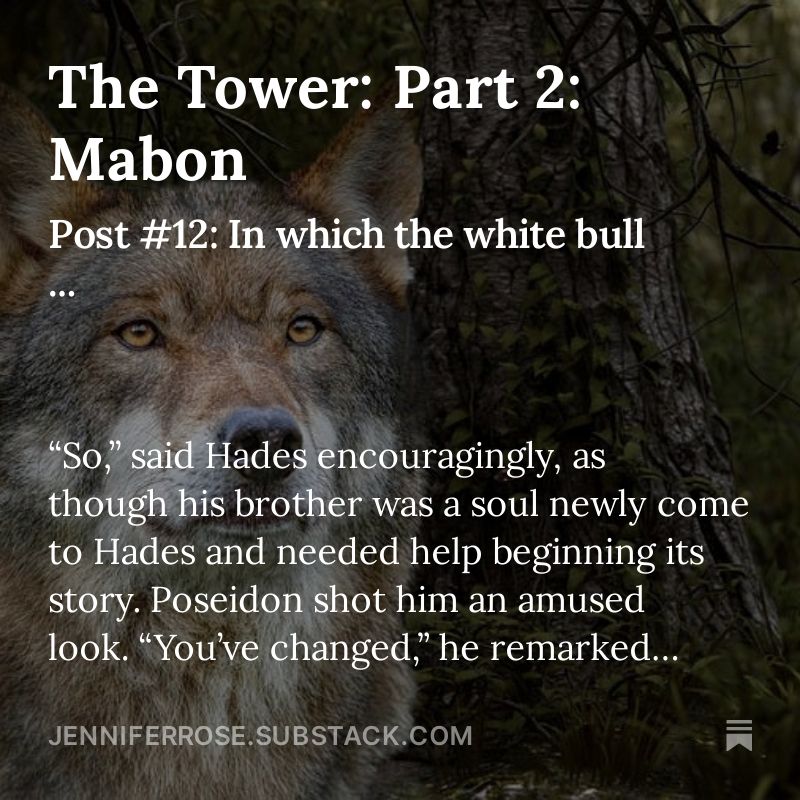by Jenny Rose | Jul 6, 2024 | A Flourishing Woman, Spirit
Unusually, I’ve struggled the last couple of weeks to find something I wanted to write about for this post. At times I feel so heavily weighted with grief, fear, and despair about our world (and I mean our to include all people, all species, all life on this lovely, feverish planet suspended in the cool bed of space) and the apparent lack of sane, unified values and problem solving, it’s all I can do to keep putting one foot in front of the other. I’m sustained by my communities on Substack and in real life, my garden, and the simplicity of whatever moment of Now I inhabit. At this moment Now is the smell of chicken crisping in the air fryer, the cool, damp air of a July 4th morning in central Maine coming in open windows, the weight of my laptop on my lap, the feel of its keys under my fingers, and the sleeping cats. It’s a day off. I relish it.

Photo by NASA on Unsplash
I don’t want to write about the state of the world. I have nothing to add to the conversation that feels effective or positive. I’m one of the silent millions, maintaining faith and courage as best I can for my own sake as well as the sake of those around me.
Earlier in the week I received a post from Dr. Sharon Blackie titled ‘Following the Wrong Gods Home’ that caught my imagination and gave me a different perspective.
Through the fog of sadness and fear a clear question rang in my mind: what would Baba Yaga do? And another: what gods am I following, and are they taking me home? And then, I can choose which gods to follow.
Sometimes I forget that.
Just like that, I was back in my power. I jotted down some quick notes and went off to work, feeling better.
Dr. Blackie didn’t mean this question in the formal religious sense, but in the metaphorical sense. Much of what is happening in the world now has to do with the gods people create, worship and follow. Not only real people but gods like money, status, technology, and power. To them we build temples, make blood offerings and human sacrifices. We worship them with our belief and our lives and place them above the law, feeding them with power, and they are rapacious.
No wonder Justice is blindfolded. I’m in complete sympathy. We should give her ear plugs, too.
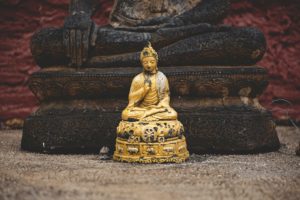
Photo by Peter Hershey on Unsplash
I think a lot about gods and goddesses. I research their stories and cultures, explore their symbols, sculptures and depictions. I write about them, dream about them, and work with various card decks referencing them. I think about our consistent human propensity to reach for something larger than ourselves, something wiser, stronger, more powerful. We seek some sense of meaning, hope there is reason for all this chaos, that one day we will come back home to ourselves and our family of all human beings on Planet Earth.
Of all the gods and goddesses I’ve made friends with, I love Baba Yaga the best. I’ve written about her before on this blog. She’s Slavic, a hag goddess associated with witches (of course).
I don’t think of myself as a feminist, but the Baba is, for me, the perfect embodiment of female wholeness. She is not obedient or submissive. She is not attached to a man. She carries no shame, no guilt. She’s wild, primal, and powerful. She has feelings and expresses them. She lives proudly in her (conventionally) hideous body. (I’m sure she doesn’t shave, trim, deodorize, make up, color her hair, do her nails or dress appropriately for her age.) She cannot be silenced. She is wise and ancient beyond wisdom and years. She does not suffer fools. She pleases only herself.
A long time ago, in an audio production narrated by Clarissa Pinkola Estes, she said women were made for times like these. I haven’t thought about that in years, but the morning I read Dr. Blackie’s post I remembered it, and I stood a little taller as I made breakfast.

By Carmine Leo
Women, after all, know how to live in a desert. We know how to live underground. Like water, we learn how to go around obstacles and wear away stone. Women endure. We wait. We bide our time and survive. Individuals may be burned, or killed, or silenced, but collective female wisdom lives on in stories, skills and crafts, recipes, traditions and ritual. Women, as vessels of life, understand death. We know how to let die what must, even if it’s ourselves. We know endings are always beginnings.
These are not times for too-sweet maidens and princes on white horses. These are times for survival, clear seeing, hard choices, courage, cunning, and strength. These are times in which we must remember how to be responsible for our own safety, reproductive health and autonomy, and education. We don’t need permission. We don’t need approval. We don’t need men to take care of us. We’ve never needed those things; it’s time to recall and reclaim that truth and teach our younger sisters and daughters how to be wild and true.
We can always make choices. I have already left Ozymandias lying in the desert behind me. I will not follow fear and despair; they cannot take me home. I will not comply with repression and oppression, neither my own or that of others. I will not be silenced. I will resist. I will persist. I will face whatever comes with my head up. I will go around, or under, or over whatever or whoever attempts to control me.
I will choose which gods to follow home.
Questions:
- Which gods have you followed in your life? Did they take you home?
- Have you chosen the gods you follow, or were they thrust upon you?
- What sacrifices and offerings have your gods demanded of you?
Leave a comment below!
To read my fiction, serially published free every week, go here: 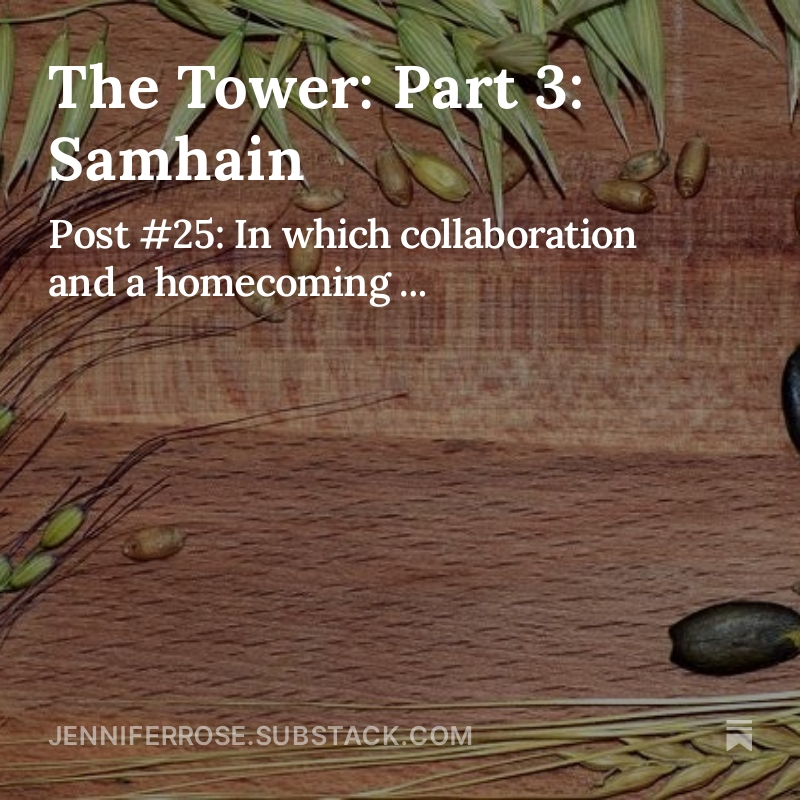
by Jenny Rose | Jun 22, 2024 | Emotional Intelligence, Needs
In a recent conversation, someone asserted to me that ultimately everyone does what they want. I felt an immediate fury. That does not describe my life at all. I chewed on my outrage and resentment for a few weeks, simmering, until I decided to get over it and figure out why I was so hijacked.
I was immediately lost in the puckerbrush. Making choices about what we do and don’t do is intimately tied to needs and wants, and I have yet to be able to distinguish between the two once beyond the level of survival needs, or find any kind of clarity from someone else. Needs and wants are unpleasant territory I don’t want to explore. (See? There it is. I don’t want to. Yet I am, and I might need to.)
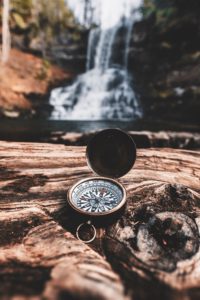
Photo by Bryan Minear on Unsplash
Then there’s the whole actions versus words aspect. People say they want things but don’t act accordingly. If we really want something, our behavior reflects it. If our behavior does not reflect our stated wants, we’re deceiving ourselves, or someone else, or both. I deeply distrust mixed messages. More unpleasant territory and old trauma.
Choice is in there, too. Choice is a big subject and a major theme in this blog. As I’ve mused on the statement ‘we all do what we want to do’ and made notes (you know I always make notes), I’ve wondered how we can compare a parent in some war-torn place attempting to keep their starving child alive another day with a wealthy person trying to decide if they want to fly their private plane to Paris for dinner or stay in and watch a movie in their in-home theater and have their chef prepare a seven-course meal. With wine, naturally.
One person has limited choices, all excruciating, to achieve continued survival for a few hours. The other has almost unlimited choices, all luxuries. How can I possibly compare the two? Can we say the parent trying to keep their child alive is doing what they want to do? Come on! Yet they do want to keep their child alive, right?
Perhaps it seems complicated and confusing because it’s complicated and confusing.
I wound up with a page full of notes, some sobering personal revelations, and a hairball.
On an internet search, I found articles pointing out the distinction between doing exactly what we want to do in any given moment (a toddler or a hedonist) and doing things we don’t want to do in service to an outcome we do want. That made sense to me.
If we focus on wanted outcomes rather than individual actions, we must have the ability to plan, look ahead, anticipate, and understand possible consequences of our actions. We also must attempt to predict the responses and reactions of the people around us to our actions, which means we have to understand something about emotional intelligence …
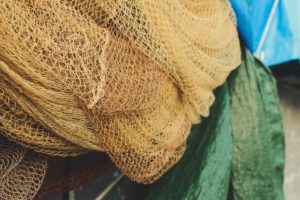
Photo by Manuel Sardo on Unsplash
… and now we’re back in the puckerbrush. I hate predictions. I don’t like leaps of faith. (I have a magnet on my fridge that says “Leap and the net will appear.” I don’t know why I keep it. It makes me mad every time I read it. Show me the warranty on that net. Show me the weight testing. Show me the damn net, in fact. Who will set it up when I leap? Are they paying attention or looking at their phone?) I trust my intuition, but I know I can be wrong. People are unpredictable. Life is unpredictable.
And yet we humans, including me, make choices all day long every day based on what we think will or might or could happen next. I’ve written about attachment to outcomes before. As I get older I’ve replaced a lot of my desired specific outcomes with simply wanting to know I did my best, regardless of outcomes. I may not like the outcome I get, but my integrity remains intact.
And then there are the people who don’t seem to understand actions and consequences in any kind of relationship. They choose what they choose in the moment and are hurt and/or outraged to discover the downstream consequences of that choice, especially in the context of many other choices. I observe this is a frequent divide along male/female lines. Women generally see everything as connected. Men generally see most things as discrete, in their own box. This is just one reason why I think “romantic” male/female relationships can be so devastating. We are often on different pages without knowing it.
If it’s true that we all do what we want in service to a desired outcome, what happens when my choices collide with yours? If you perceive me as blocking progress to your desired outcome you’re going to feel angry, and vice versa. We’re going to want each other to make different choices aligning with our personal desires. Most of the time, people won’t do that. We’re all attached to the outcomes we want.
A big piece of this for me is emotional labor, that hidden torrent winding through my life, sweeping away incalculable energy, time, and innocence. One of my priorities is healthy relationships. Close healthy relationships require time and attention; the ability to make choices for the good of the relationship rather than considering only our own wants and needs. This is an ongoing practice, not doing something we really don’t want to do once every six months and expecting applause. It means we have to face our own demons, learn to communicate clearly and honestly, negotiate, share power, and problem solve. It means boundaries and respect. It means reciprocity.
Having learned about reciprocity, I now prioritize my relationships to the degree the other does. I will not sign up to do all the emotional labor. I’m not interested in a close relationship like that. The price is too high. I’d rather put my energy into my relationship with myself. At least I appreciate my own efforts!
My conclusion about this ‘we all do what we want’ thing (gritted teeth – it still makes me mad), is it may be true if we consider our choices in the context of outcomes. I’ve made a lot of choices out of the clear knowledge that they were simply the right thing to do, too, choices that have been terrible for me, terrible in some of their consequences, yet ultimately still were the right thing for me to do. I had no outcome in mind. I don’t regret those kinds of choices, but they left permanent scars.

Photo by Cristian Newman on Unsplash
I want to blame others for all the time I’ve spent doing things I didn’t want to do, but it seems what we do and don’t do are entirely in our own hands, our own responsibility. Our lives are built on the choices we make, big and small, every hour of every day. If we don’t like our lives, we need to pay attention. Perhaps the useful question to ask ourselves if we hate what we’re doing at any given moment is, “Why am I doing this?” If we’re focused on a particular desired outcome, we may need to stop and think about whether our actions are effective in getting us there. Spending years of our lives desperately hoping and trying to reach an outcome and doing things we hate is not effective. I know this from personal experience. Our wants and needs change over time; what we once longed for may no longer be something we’re interested in. Sometimes we need to reality check ourselves. If we’ve been trying to get loved, for example, or please someone for a long period of time, it might be time to acknowledge our goal is not attainable or not worth attaining. Sometimes no matter how hard we work for an outcome it’s not achievable.
Then there’s the flip side: None of us do what we don’t want to do. That one is equally hard for me to swallow, but that’s a conversation for another day.
Questions:
- How much of each day do you spend doing things you don’t want to do? Why?
- What desired outcome(s) in your life requires you to do things you don’t want to do?
- Do you see your daily choices as isolated or part of a larger context attached to your wants and needs?
- Do you feel forced to labor emotionally? What would happen if you stopped?
- Who in your life reciprocates your level of emotional labor?
Leave a comment below!
To read my fiction, serially published free every week, go here: 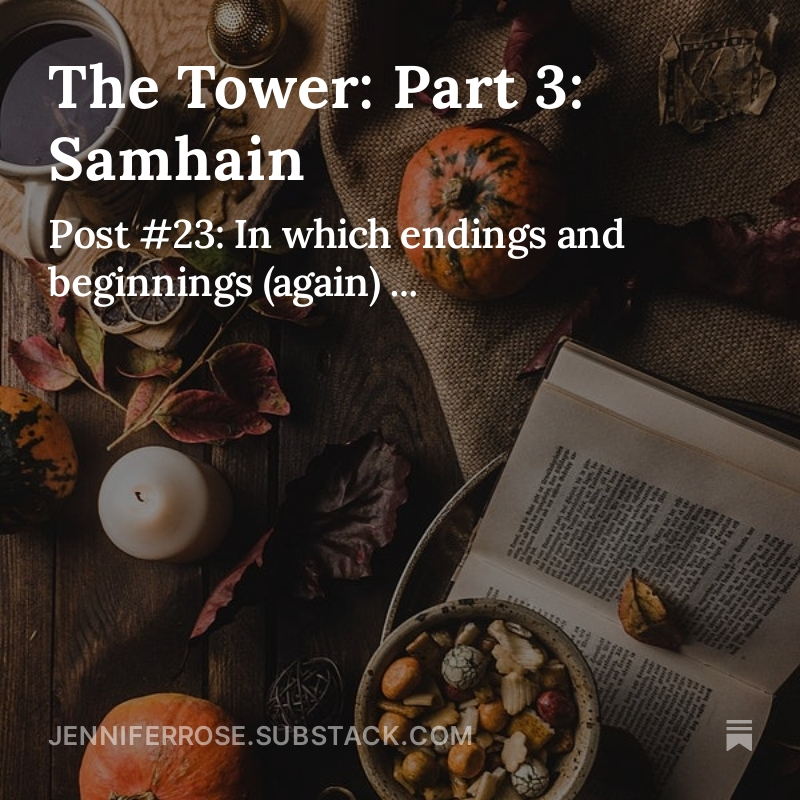
by Jenny Rose | May 26, 2024 | Connection & Community, Emotional Intelligence
I’ve always said I hate politics. In hindsight, what I was really expressing was discomfort with divisiveness and conflict, lies and deceits and power games. Talking about politics feels like pinning Jello to the wall. People throw labels and jargon around. Terms are not defined and agreed upon. True intent is obfuscated. Actions and words don’t line up. Contempt and outrage rule.
The last eight years have been brutal in the political arena. I have an internal list of words that send me into immediate flight from conversations and interactions. If I can’t flee, for example if I’m at work, I put on a neutral face and withdraw, leaving a robot to carry on until the subject has changed to vacations, or family, or gardening, or even the same personal health stories I’ve heard from patients and patrons many times before. Anything but politics.

Photo by roya ann miller on Unsplash
Yet everything feels politically charged right now. Every aspect of our culture, our basic needs, our planet, our economics, our bodies and our minds, winds up in an increasingly bleak morass of hatred, violence, fear, isolation, and manufactured confusion.
Interestingly, in my own fictional work, I’ve been stuck for some time in writing about a small egalitarian community whose harmony is disrupted by a member who actively seeks more power. The de facto leader, a woman, doesn’t know how to combat this aggression because I don’t know how to combat it!
Last winter my partner talked with me about a video series he’d found on YouTube called What is Politics? Before he was finished talking I was shaking my head. I wanted nothing to do with it. The words and terms are meaningless. It’s all just hate. It’s impossible to talk sensibly about and I don’t want to know more than I know; I don’t want to wander around in a toxic wasteland during my free time. Besides, I want to read, not listen to and watch YouTube.
(Yes, I am a bit of a snob that way.)
My partner sent me a link anyway. He’s persistent like that. I was duly annoyed. For some reason, I didn’t delete the link. One day when nothing in particular was going on I clicked through and watched it.
Irritatingly, I was impressed. The presenter (I think his name is Daniel) is smart, by which I mean he’s incredibly knowledgeable, well read, well spoken, and he’s a synthesist. He understands complexity. He has a sense of humor. He was not hateful and he did not speak in jargon. He pushed no ideology. He defined every single term he used. In fact, the very first thing he did was define politics as “anything related to decision making in groups.”
That simple, clear definition hooked me. I saw at once that politics are everywhere because politics are everywhere. My perspective widened from our current shameful global and national politics to include home, school, work, and neighborhoods. When two or more people are together anytime, anywhere, politics are in play. My resistance dissolved. I wanted to learn more. I sensed I was on the edge of figuring out how to solve my creative fictional dilemma.
My partner sent all the links to the video series and I settled down to go through the videos, one at a time. I use a split screen, taking notes on one side and watching the video on the other.
Politics is about power, the power to make decisions. It’s ridiculously simple. Without understanding it, I’ve been writing about politics for eight years on this blog as I explore choice and personal power. Power is something we all need to understand and master; it’s the cornerstone of emotional intelligence and living effectively.
This series has been the most valuable piece of learning I’ve engaged with since I learned emotional intelligence, more than ten years ago. I understand now why I’ve never been able to get a handle on politics, and why I’ve been so repulsed by the whole subject. Subconsciously, I’ve recognized the language games and manipulations, and I won’t deal in language games and manipulations. I don’t trust ideology, including my own. I don’t trust “news.” I don’t trust all the “worbs,” Daniel’s term for meaningless language no one defines clearly and correctly. Just about the only thing I do trust is that following the money behind every ideology, whether it be food, climate, aspects of gender and sexuality, geopolitics, religion, or elections, invariably uncovers corruption and reveals the puppet masters.

Photo by Tim Gouw on Unsplash
And we are the puppets. Nicely divided along manufactured lines. Emotionally manipulated into defensiveness, distrust, hate, and fear so any kind of unity against the powerful elites who have a stranglehold on the vast majority of wealth and decision-making becomes increasingly improbable. The economic inequality most of us stagger under, the thing we all have in common, cannot be clearly seen because we’re captivated by a thousand tempting but ultimately meaningless ways to hate and fear one another.
That’s just the way the people at the top of the hierarchy want it. We’re good little “patriots,” incapable of unifying.
I don’t usually choose willful ignorance. It’s not a useful choice, but until now I hadn’t found a clear, concise, pragmatic way to become educated about political terminology and history. I’ve never before recommended a video series. I hope you will check out What is Politics.
Questions:
- What are your current reactions to the subject of politics?
- What aspect of politics do you find particularly troublesome or uncomfortable?
- Do you feel more or less connected to family, friends, neighbors, and community than you did ten years ago?
- Would you prefer to live in a political context of economic equality or economic hierarchy (our current state)?
Leave a comment below!
To read my fiction, serially published free every week, go here: 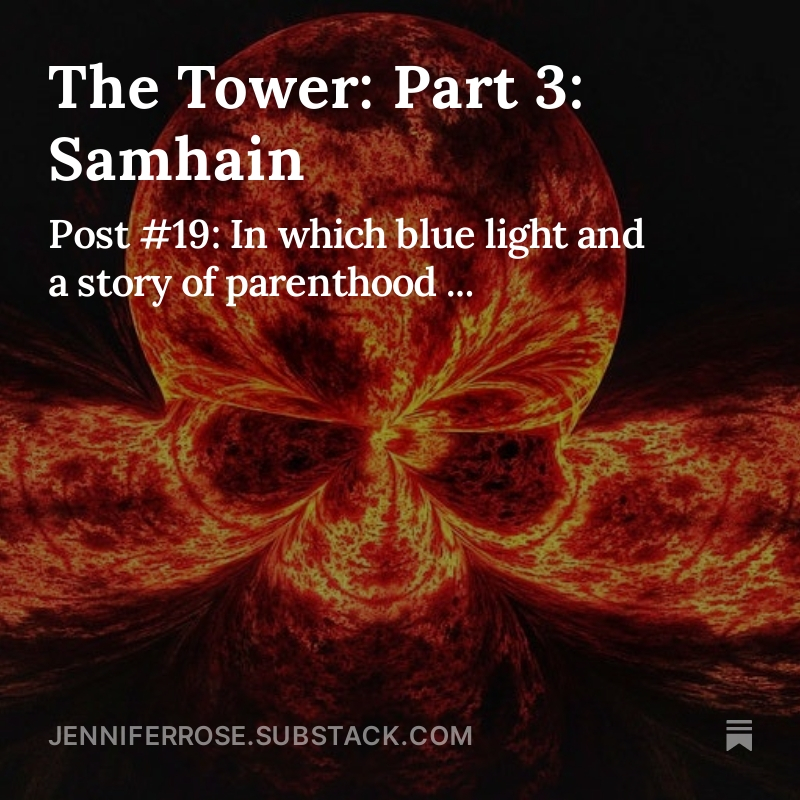
by Jenny Rose | Apr 13, 2024 | Connection & Community, Emotional Intelligence, Shadows
I have felt, for a period of some years and more frequently since 2016, that the planet would be better off without human beings. I’ve said it, I’ve thought it, and this is the first time I’ve written it. I would be happy to be the first in line, gladly give up my life in the certain knowledge that without us, Earth could heal, cleanse itself, and nurture all the countless species we have failed to notice, value, and cherish. Let the rape stop. Let the wide-scale poisoning stop. Let the brutality, suffering, stupidity, greed, and criminal disregard for others stop.

Photo by NASA on Unsplash
I freely admit to the pessimism and bitterness inherent in my view. I’m also aware of how paradoxical it is. I truly care about most people. Put a single human soul in my path, and I rarely fail to make a connection and feel some kind of empathy and kindness for them. I’ve spent my life caregiving, supporting, and teaching people, taking great joy in my contribution.
In my last few posts, starting with “The Locked Room,” I’ve thought a great deal about self-love and self-trust. It occurs to me my despair over human behavior as a whole must include me. My willingness to see us all wiped out includes a willingness to be wiped out myself. If other humans are capable of the atrocities happening all around us every day, so am I. If I want to see that dark potential destroyed, if I’d be glad of it, even, my self-love is seriously incomplete.
I’m not sure I’d call it self-hate. I don’t hate myself, you, the stranger on the street, or friends and family, but I hate what we are capable of. I hate what we can (and in some cases choose to) do. I believe some of us are willing to heal, grow, change, unite, and make better choices, but right now most of the human power in the world (as we understand power) lies in the hands of a few louts nobody seems to be able to overcome. Indeed, many cheer them on.
And that could be any of us, cheering them on. In the right context, with the right ideology, it could be any of us. I am too old to tell myself fairy stories about how I would never fill-in-the-blank. Easy to say as I listen to my sheets rotating in the washing machine, drink clean water from my tap, notice the old copper pipes rattling as the furnace comes on, and type on my laptop in my fully electrified, clean, intact house in a peaceful neighborhood on a Saturday morning with my feet propped up on my desk. I am sane. I am healthy. I am well-fed, housed, and employed. Most people do not have the luxuries I take for granted, the safety, the peace. People do terrible things out of terrible pain and dysfunction. I am not immune. None of us are. I’ve been fortunate, and that’s through nothing but luck.
A few weeks ago I read a piece by an author on Substack, Anna Kay, who writes a newsletter called The Hinterlands. I stumbled across her “A World Without a Heartbeat” by chance. She was not a writer I was familiar with, though I have since subscribed to her. She turned me inside out. I wept. I was comforted. I was awed and envious of her evident belief in human goodness. I was softened. I was challenged.
Most of all, I was challenged. As I read her words, I glimpsed a different frame, a frame of hope rather than bitterness.
I could not possibly paraphrase her words and I wouldn’t dare try to give you a synopsis. It’s not a long piece, and if you only follow one link out of the hundreds I’ve posted here in the last eight years, let this be the one. Please.
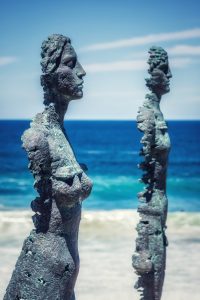
By Photoholgic on Unsplash
What moved me most was a world without humans would be a world without stories. A world without stories, a world without music, a world without art. A world without reverence and gratitude for nature. A world without human appreciation. Somehow, that seems like a terrible loss. I’m not sure why. Wouldn’t the planet be every bit as rich and beautiful if no one enjoyed it? Surely it would. Yet the loneliness of feeling unseen and unappreciated hurts because I’ve lived in the heart of that feeling.
The question I ask myself is am I willing to allow some or all of my bitterness to dissolve in order to deepen my ability to self-love? Bitterness is a heavy burden and there’s plenty in the world. Do I need or want to add to it? Is it useful?
It’s true we humans are capable of terrible things. Isn’t it also true we’re capable of remarkable courage, generosity, intelligence, creativity, and love?
Couldn’t we each make a list of human teachers, guides, beloved ones who have inspired us, protected us, and made us smile as well as a list of those who have done us wrong?
Our choice is which list to make, which to dwell on.
I’ve become deeply involved with the Substack community. I follow several other creatives simply because they inspire me. They make me feel better about the world, about life, about myself. They balance some of my despair and horror regarding the state of the world with beauty and hope. I’d like to introduce you to some of them:
Questions:
- Do you believe humans have value as a species? Why or why not?
- What human-driven activity gives you hope?
- Do you see humans as part of a healthy planet or an invasive species, wiping out all competitors?
Leave a comment below!
To read my fiction, serially published free every week, go here: 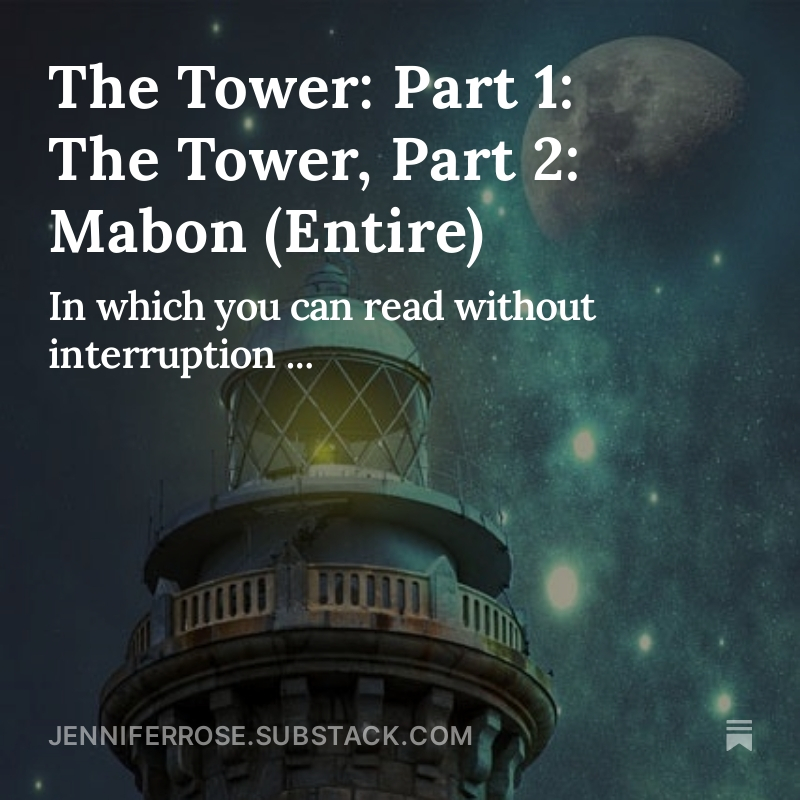
by Jenny Rose | Mar 30, 2024 | A Flourishing Woman, Self-Love
When I wrote about internal locked rooms earlier in the month, I had no idea how much there would be to unpack. In subsequent discussions about locked rooms and unconditional love (for a connect-the-dots map go here) a friend tells me she believes trusting herself is the biggest barrier for her in unconditionally loving herself. Me being me, I asked her how we define trust. In asking her I asked myself.

Photo by Jonathan Simcoe on Unsplash
Here we go again.
Trust is defined by Online Oxford Dictionary as “firm belief in the reliability, truth, ability, or strength of someone or something.”
Trust is a tricky subject for me and I’ve so far avoided taking it head on, but this feels like the right time. Part of my hesitation to talk about it is my own identity as a person who doesn’t trust easily.
I feel that piece of identity as a shameful aspect of my character. As I write this, I have a vivid childhood memory of being in the back of a dim car in a blinding snowstorm feeling scared. An adult in the car was also fearful, as were the family dogs. The driver asked me, “What’s the matter, don’t you trust me?”
The answer clamored inside the car, “NO!” For a moment it seemed to me we’d all shouted it, though nobody said a word and I huddled, frozen with fear and not daring to speak, in my corner.
It’s bad not to trust; disloyal, unloving, unnatural. But I learned very young trusting those around me was dangerous. All my life I’ve been torn between my shame about not trusting and a determination to survive and learn to self-defend … which sometimes (often?) means not trusting.
I don’t see trust as a black-and-white belief. I might trust someone completely with money and business affairs, but not at all as a confidant. I might trust someone as a parent but not as a dog walker. I might trust someone’s essential goodness but not their reliability in following through on plans.
This question of trusting ourselves, though, is slightly different. What does it mean, exactly, to not trust ourselves? What do I mean when I say it to myself?
Trust is defined as a belief, and beliefs can and do change. Belief is a choice. My belief that I’m untrustworthy is not something I was born with, but something I internalized from my family. I’m untrustworthy because I’m dramatic, I struggle with math story problems, I have needs and feelings, I’m intuitive, I’m sensitive, I have boundaries, I challenge authority and rules, and I tell the truth, among many other reasons.
Internalized voices are a bitch, because we don’t realize or remember they came from someone outside us.
And people outside us lie. People outside us can never fully see what’s inside us. People have agendas, their own wounds and trauma, and navigate around their own internalized bullshit.

Photo by Cristian Newman on Unsplash
People outside us are not necessarily reliable sources about our worth and value as a human being.
If trust is a “firm belief in the reliability, truth, ability, or strength of someone or something,” we have specifics we can explore.
Reliability: I know myself to be reliable. I have many flaws, but my integrity is strong and I keep my word to myself.
Truth: A thorny aspect of trust. I wrote two paragraphs here about the ways in which others perceive my truthfulness. On edit, I realized none of that has to do with my truthfulness with myself, which will always be invisible to the outside world. Do I trust my truthfulness with myself? Yes. Absolutely.
Ability: This is my weakest area of self-trust. In some ways. At some times. I wrestle every day with imposter syndrome. On the other hand, I absolutely trust my ability to write, to teach, to swim, to dance, and to do many other things. Oddly, though I trust my ability in most cases, I don’t want others to trust my ability because I have a huge fear of disappointing people. This, too, is an old wound, first opened when I received constant messaging about how disappointing and inadequate I was as a child. Because of that, I don’t want people to rely on me for fear I’ll let them down, not from my perspective, but from theirs.
I told you trust was tricky for me.
Strength: Which brings me to strength. This, for me, is a no-brainer. I have absolute belief in my own strength. God knows I wouldn’t be sitting here at the keyboard typing if I hadn’t been strong all my life.
Given this mostly positive review of the components of this definition of trust, what’s the problem? Why have I so consistently mistrusted myself during my lifetime?
I can easily come up with two reasons. There may be more lurking in the background, but these two are in front: One is trust in my physical body, and the other is perfectionism.
Perfectionism is one of the first things I wrote about on this blog. It’s another piece from my childhood I’ve struggled with it all my life, and I’m certainly not the only one. I’m conscious of it now, which is helpful, but it affects every day of my life and if I’m not mindful it rules me. Publishing this blog was one of my first real efforts at resistance. It took more than a year of weekly publishing to stop feeling panic as I pushed the “publish” button after a reasonable amount of writing and editing.
Even as perfectionism drives me, I’m aware enough to know I can’t define it beyond pleasing people. Which is impossible, and I know that. Yet the internal pressure to be perfect seems to be inescapable.
I’ve also written extensively about expectations. As a child, I was expected to be perfect according to conflicting expectations from three adults on whom I was dependent. Needless to say I failed to please any of them, which meant I lived in a constant state of shame and fear of abandonment. A perfect setup for internalized self-loathing. The road from self-loathing to considering unconditional self-love has been an amazing journey.
I was aware, as I explored ability, reliability, truth, and strength above, of a little voice in my head saying, “Yes, but—,” a precursor to the time I was late, or forgot an appointment, or the occasions I did deliberately lie, or the times I felt weak, or when my ability did not live up to my own unconscious standards of perfectionism.
As I became aware of this, I realized I will never trust myself if I aspire to be perfect in these four categories. I have never been perfect, I am not perfect, I never will be perfect, and I’m not much interested at this point in my life in attaining perfection in any way.
So fuck off, perfectionism. I’m not your bitch anymore. AND you will not stop me from loving myself, unconditionally or otherwise. Unconditional love is not built on some ridiculous set of expectations.
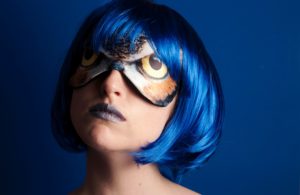
Photo by Emma Backer on Unsplash
Which brings me to an interesting insight on my relationship with my body. Let’s not do the body-as-a-political-signal thing, OK? I’m sick of it. We all live in a body. We have baggage about how our bodies look and function. We’re pressured, every day, to try to buy a “better” body, especially children. In today’s world, many of us feel we “should” be different, no matter what we look like. Currently, we’re obsessed with appearance and virtue signaling rather than health and function.
I don’t hate my body. However, due to autoimmune issues and years of chronic pain, I haven’t trusted it. Until the last ten years or so, since I’ve gone carnivore, my physical state was extremely limiting; I was unable to engage fully in activities I loved, get regular exercise, or even reliably manage the activities of daily living without severe pain.
Now I have my inflammation under control, my chronic pain is gone, and I’m able to joyfully live the kind of active lifestyle I’ve always wanted: gardening, walking, swimming, water aerobics, free weights, stretching, a little yoga, a little Pilates, a little time in the gym. I’m healthier and more active than I’ve ever been, but I am aging, and as I age, my body is changing. (Big surprise, I know!) I noticed, in my post about unconditional self-love, some of the things I wrote about unconditionally loving were physical things. In this culture, nobody tells us to love our varicose veins, or our age-spotted hands, or our lined neck. Instead, we’re encouraged to buy something and “fix” all those problems, or at least hide them.
That’s not unconditional love. (I also deny it’s “body positivity,” but I don’t want to dive into that rabbit hole!)
I know if I push myself too hard my body will hurt. I know if I allow my anxiety to spin out of control I won’t sleep. I know if I eat a whole pizza I will a) have inflammation and pain from the carbs and b) have severe constipation (cheese). I know if I garden for too many hours at a time I’ll be too stiff the next morning to get dressed without sitting down. I know if I spend too many hours in the pool I’ll develop eczema on my elbows and hips.

Photo by Cristian Newman on Unsplash
I ask myself, does all this mean I don’t trust my body? Because it actually sounds like I do trust it to react to my choices in various predictable ways. Is what I’m really saying I don’t trust my body to be a 20-year-old perfect body?
Well …. Yeah. I guess that is what I’m saying. Pretty silly.
My friend doesn’t feel she can unconditionally love herself without trusting herself. She’ll navigate her own path through all this. My own conclusion is I can trust myself. Perhaps I should consciously start doing so. (What an idea!) For me, lack of self-trust is not an obstacle to unconditional love, but it certainly makes a nice contribution to it.
Questions:
- Do you see trust as essential to unconditional love?
- Do you agree with this definition of trust? If not, how would you define it? Can you find a better definition?
- What aspect of trust in this definition do you struggle with the most?
Leave a comment below!
To read my fiction, serially published free every week, go here: 